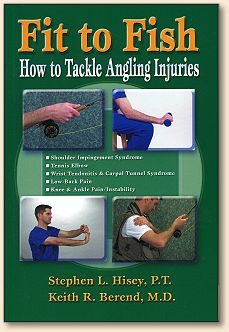Reviewed by Larry Compton (Canoeman 1947)
 The impetus for this review was a recent
posting on the Bulletin Board in which a
question was asked regarding rotator cuff
surgery of the shoulder. As a physical
therapist I felt compelled to offer my two
cents worth to this discussion. A mention
was made of a new book concerning prevention
and treatment of angling injuries, and after
I looked it up, I felt I had to have this book
for my collection. I offered to review this book,
and somewhat to my dismay, JC took me up on it.
The impetus for this review was a recent
posting on the Bulletin Board in which a
question was asked regarding rotator cuff
surgery of the shoulder. As a physical
therapist I felt compelled to offer my two
cents worth to this discussion. A mention
was made of a new book concerning prevention
and treatment of angling injuries, and after
I looked it up, I felt I had to have this book
for my collection. I offered to review this book,
and somewhat to my dismay, JC took me up on it.
We, as fly fishers, usually take good care of
our equipment. We try to keep our lines clean
and properly maintained (witness all the line
cleaning and lubricating agents that we spend
our money on). We clean and lubricate our reels.
We wax our rod ferrules. There is, however,
one piece of essential equipment that is usually
poorly maintained and protected. Unfortunately
this piece of equipment is the most expensive to
repair and cannot be replaced. This indispensable
piece of equipment is known as the human body. I
am sure most of us have at one time or another
taken a fall either in a river, approaching a
river, or exiting a river. What is the one thing
we usually do in this scenario? Of course, hold
the rod high to avoid damaging it. We thus save
a fly rod that may be very expensive, perhaps as
much as $600 to $700, while risking an injury to
ankle, knee, hip, spine, wrist, elbow, or shoulder
that could only cost us a piddling $15,000 in
surgery and rehabilitation. Of course, as fly
fishers, we know this to be a reasonable course
of action. After all, the rod may not be insured,
but we have medical insurance to take care of such
things as dinged up bodies.
As a practicing physical therapist, I routinely
evaluate and treat such problems as shoulder
impingement syndrome; tennis elbow; golfer's
elbow; wrist tendonitis; carpal tunnel syndrome;
low back pain; and knee and ankle pain and
instability. Except for cases involving trauma,
most of these ailments can be prevented or fairly
easily treated, at least in the early stages.
This is the purpose for which Fit to Fish
was written. The authors, Stephen L. Hisey (a
physical therapist) and Keith Berend (an orthopedic
surgeon), are both fly fishermen with many years
of experience. During the time he was in medical
training in North Carolina, Dr. Berend noticed
that several of his fly fishing friends were
suffering from maladies that occurred while fishing.
He "designed, implemented, and published an
Internet-based survey study on the orthopedic
maladies in people who fly-fish." From the
results of that survey, along with the same
survey questions administered to a group at a
Trout Unlimited meeting, he found that the types
of injuries listed above are the most common among
fly fishers. The results of that study were
published in the Journal of the Southern
Orthopedic Association in 2001. It was
on the backbone of that study that Fit
to Fish was written.
This book focuses primarily on overuse injuries
that many of us have experienced as anglers.
These are the types of injuries that nag at
us as we follow our pleasant addiction to fly
fishing. If left untreated, they can
potentially destroy our ability and desire
to fish.
The authors have done an outstanding job of
describing these injuries, how they develop,
and how they can be treated. Perhaps even
more importantly, how we can prevent most
of these problems. They have done a very
good job of organizing the information. While
some of the information covers rather technical
matters such as anatomy and physiology, it is
written in a way that is not difficult to
understand (certainly not as difficult as
reading unfamiliar waters) They have managed
to incorporate some of their own experiences
as fly fishers to illustrate in ways we will
all understand how some of these ailments
occur. They offer sound advice for basic
self treatment. Perhaps more important is
the advice on prevention through strengthening,
stretching, and posture. They leave very little
to question as their instructions are very clear
and detailed. Excellent color illustrations
are used throughout the book to aid in clarifying
the information and instructions.
Fit to Fish is, as far as I
am aware, the first book of its type on the
market. I have seen a few, very few, articles
on prevention and treatment of overuse injuries
in some of the outdoor magazines, but almost
nothing in the fly fishing media. Although
this book is written for the fly fisher, I
think almost anybody would find it valuable,
as these are the types of injuries that occur
to much of the population, whether fly fishers
or not. As a physical therapist who is also
an ardent fly fisher, I highly recommend this
book. I will probably find myself using it
around the clinic to help my patients better
understand some of their problems.
Fit to Fish may be purchased
directly from
Amato Books.com, Amazon.com,
or Barnes & Noble.com.
~ Larry Compton (Canoeman1947)
Fit to Fish: How to Tackle Angling Injuries
By Stephen L. Hisey, P.T. and Keith R. Berend, M.D.
Published by Frank Amato Publications, Inc.
P.O. Box 82112
Portland, OR 97282
(503) 653-8108
www.amatobooks.com
Softbound, 6 x 9 inches, 158 pages, color
ISBN: 1-57188-354-1
Price: $19.95 US
Previous Reviews
|



